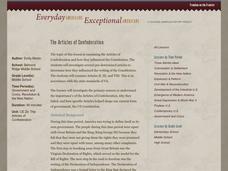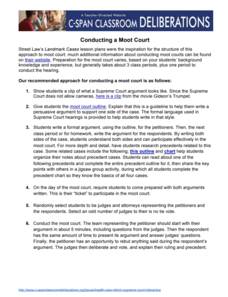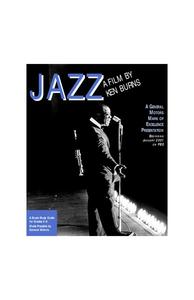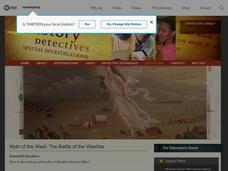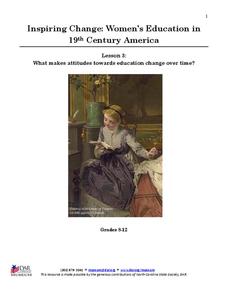National WWII Museum
Pearl Harbor: Analyzing FDR's Pearl Harbor Address
FDR's words calling the attack on Pearl Harbor a "day in infamy" have been immortalized. Learners use analysis and discussion questions to consider the origins and drafting of the famed speech that brought the United States into World...
National Endowment for the Humanities
Revolution '67, Lesson 1: Protest: Why and How
To some people, protesting is as American as apple pie, but the factors that lead to protests can be as confusing to veteran activists as to today's youth. Revolution '67 explores the riots in Newark, New Jersey as a case study. Using...
Newspaper Association of America
Celebrating Women’s History Month
Examine the lives of four women—Blanche Stuart Scott, Madeleine L'Engle, Margaret Evans Price, and Sybil Ludington—in a 23-page activity packet. Each profile comes with a set of vocabulary and reading comprehension questions. Further...
Penguin Books
Core Curriculum Lesson Plans for Jefferson's Sons
Thomas Jefferson lived a controversial life. A series of lesson plans shares information about Jefferson's Sons, a novel about the infamous founding father. Discussion questions and other tasks explore different points of view and cover...
Penguin Books
Core Curriculum Lesson Plans for The Lions of Little Rock
Schools in the 1950s and 60s looked very different from the schools we know today. An educator's guide explores the civil rights movement and, specifically, the process of integrating schools. Questions cover key themes in the novel and...
The Alamo
The Alamo
Remember the Alamo! Scholars investigate the Battle of San Jacinto during the Texas Revolution. Using models, maps, quotes, biographies, and the Oath of Allegiance, the Alamo comes to life as the stories of those who fought and died in...
Roy Rosenzweig Center for History and New Media
The Articles of Confederation
Have you ever started a project only to realize you need to scrap it and start over? Scholars analyze the issues leading to the fall of the Articles of Confederation. A group investigation into Articles II, III, and VIII unveil the...
University of Pennsylvania
Mock Trial of Alfred Dreyfus
What if scholars based mock trials on history? The fourth installment of a five-part series on the Dreyfus Affair asks learners to read various pieces of evidence before conducting a mock trial for a French officer. Teams answer...
Curated OER
Curriculum Guide For Teaching Texas History
Follow Texas history from Native Americans all the way to the 21st Century. Teachers analyze the creation of a year-long course on Texas history and use a wide range of teaching subjects and materials to guide them through the state's...
Constitutional Rights Foundation
Puritan Massachusetts: Theocracy or Democracy?
Was Puritan society governed as more of a theocracy or democracy? After comparing and contrasting a series of primary source documents, middle and high schoolers form small groups and debate the question.
American Bar Association
News Literacy Model Curriculum in Social Studies
Scholars investigate news literacy in the twenty-first century. They use technology, legal decisions, writings, and digital privacy to analyze the topic. Using what they learned, a group assignment looks into both the challenges and...
C-SPAN
Conducting a Moot Court
Review the conduct of different roles within the Supreme Court. A moot court activity educates learners about the roles of each member of the court and the process of a case with video clips, research activities, a graphic organizer,...
Alabama Department of Archives and History
Inside the Wire: Internment of Prisoners of War in Alabama during World War II
Create an open environment of discussion and collaboration with several exercises in a thought-provoking resource. Pupils conduct a gallery walk and lead a discussion before filling out a question sheet and chart during the learning...
EngageNY
TASC Transition Curriculum: Workshop 12
How can opinions slant facts? Workshop participants learn how to examine primary and secondary sources and identify the author's point of view. They also examine how visual art impacts the meaning and rhetoric of sources. Full of...
C-SPAN
Make a “Deliberations” Site
Many hot button issues require deliberations, even in your classroom! Learners work in teams or as individuals to decide on a deliberation question to make into a Google site. They research the topics in depth, discuss both sides of the...
General Motors Corporation
Jazz
Over the history of the world, music has been at the heart of some of the greatest social and political movements. Scholars discover their musical roots as they dive into the sounds and emotions of renowned jazz players. They see how...
University of California
The Civil War: Final Assessment
Pupils discover the true nature and purpose of the Civil War in the eighth and final installment of an informative series. Using primary and secondary documents, history buffs merge social study knowledge with English skills to create a...
University of California
The Civil War: Effects of the Civil War
Imagine being on the front line of the Civil War —from the front porch of your own house. Scholars use visual evidence from primary and secondary sources to analyze the impact of the Civil War on all Americans. They examine the research...
C-SPAN
Student Symposium and Resulting Action
Your class may not be able to vote yet, but that doesn't mean they can't feel like they're part of the presidential election! The resource creates a symposium where pupils debate about a selected topic in current events during an...
University of California
The Civil War: Lincoln’s Speeches
Abraham Lincoln is responsible for uniting the states during the most tumultuous periods in American history, and for his elegant oratory that kept the Union believing in its cause. Young histoians analyze various speeches by America's...
National History Day
Challenging the Status Quo: Women in the World War I Military
Why are some so resistant to change? The status quo is often to blame for a lack of forward movement in society. Following the events of World War I, women in America suddenly had a voice—and were going to use it. Scholars use the second...
PBS
Using Primary Sources: Nazi Spy Ring Busted
Spy games are not just for professionals anymore! Scholars use short video clips, primary documents, and photographs to investigate Nazi spies in America during World War II. The young detectives analyze the paranoia warfare can create...
PBS
Myth of the West: The Battle of the Washita
Go West, young man! Scholars use PBS video clips, slide shows, and interactive materials to create a picture of Manifest Destiny in the American West. Using a variety of primary and secondary sources, young historians learn about the...
National Society Daughters of the American Revolution
Lesson 3: What Makes Attitudes Towards Education Change over Time?
The struggle for women's rights is not unique to this generation, or even to the 20th century. Class members explore the conflicting opinions of Alexander Graham Bell and his wife, Mabel Hubbard Bell, regarding women's pursuits of higher...








